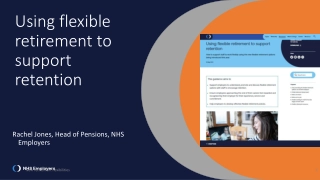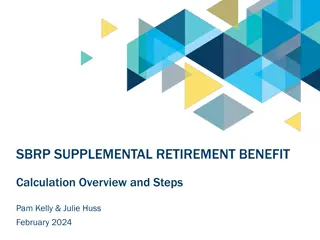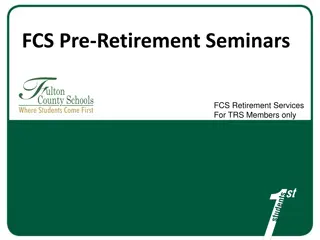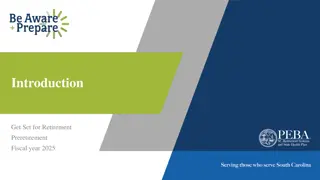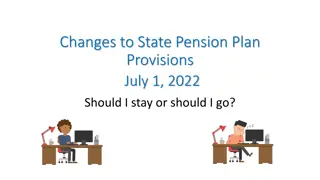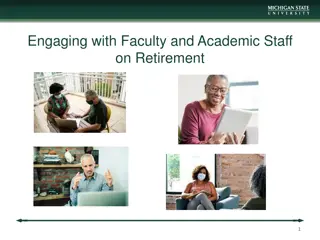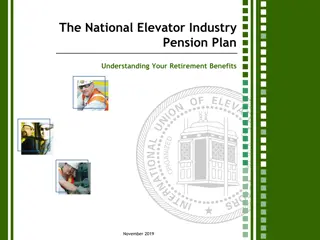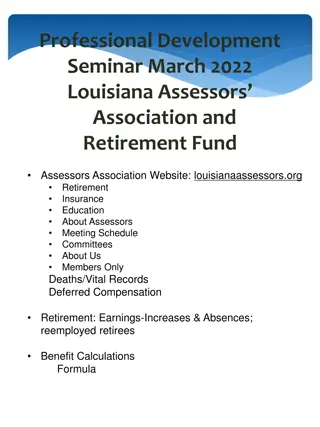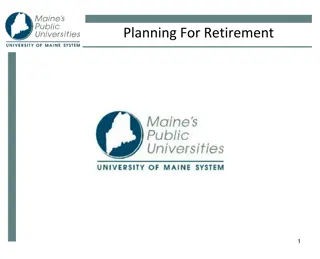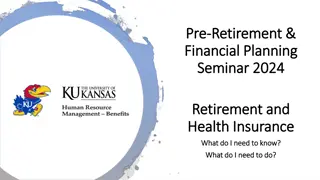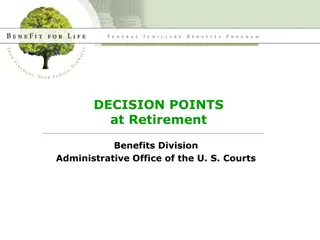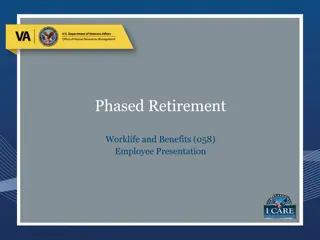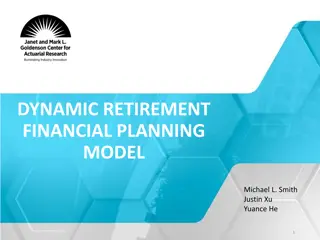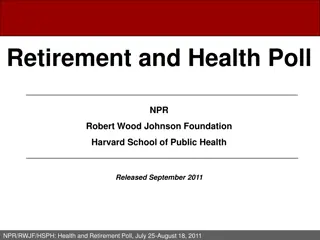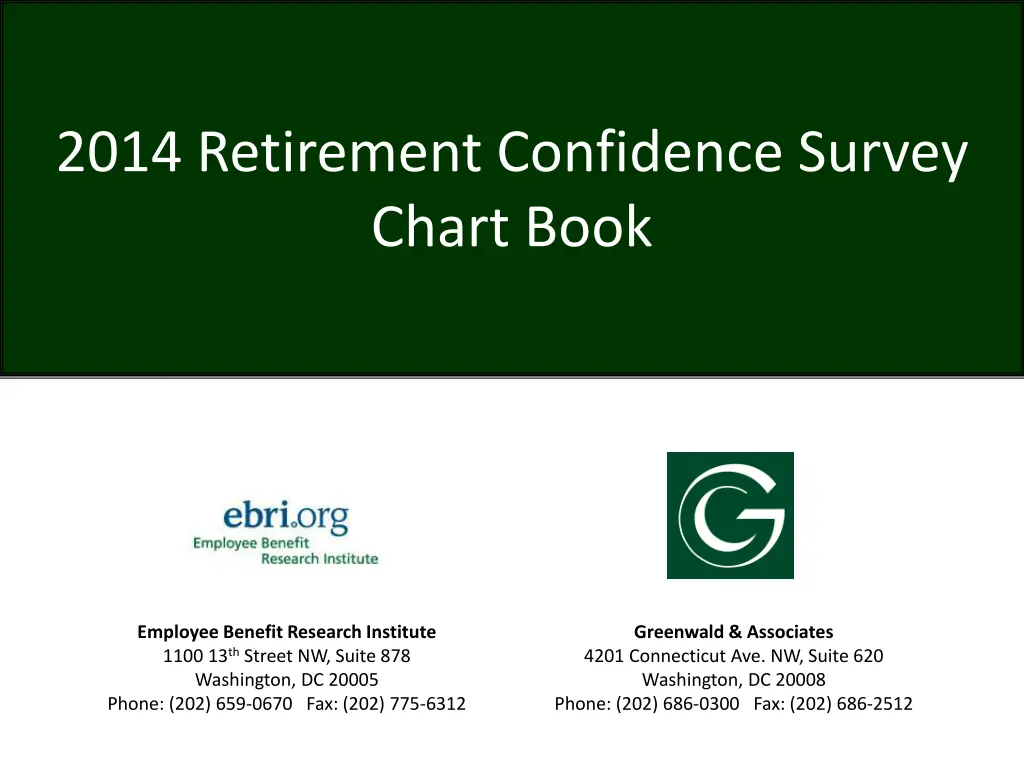
Retirement Confidence Survey 2014 Highlights and Findings
Explore the insights from the 2014 Retirement Confidence Survey, revealing a rebound in retirement confidence from past lows. The report highlights the relationship between confidence, savings, retirement plans, and income levels, providing valuable information for workers and retirees alike.
Download Presentation

Please find below an Image/Link to download the presentation.
The content on the website is provided AS IS for your information and personal use only. It may not be sold, licensed, or shared on other websites without obtaining consent from the author. If you encounter any issues during the download, it is possible that the publisher has removed the file from their server.
You are allowed to download the files provided on this website for personal or commercial use, subject to the condition that they are used lawfully. All files are the property of their respective owners.
The content on the website is provided AS IS for your information and personal use only. It may not be sold, licensed, or shared on other websites without obtaining consent from the author.
E N D
Presentation Transcript
2014 Retirement Confidence Survey Chart Book Employee Benefit Research Institute 1100 13th Street NW, Suite 878 Washington, DC 20005 Phone: (202) 659-0670 Fax: (202) 775-6312 Greenwald & Associates 4201 Connecticut Ave. NW, Suite 620 Washington, DC 20008 Phone: (202) 686-0300 Fax: (202) 686-2512
2014 RCS Methodology 24th annual measure of worker and retiree confidence about retirement 1,501 18-minute phone interviews using random-digit dialing with cell phone supplement Conducted in January 2014 after record highs in late 2013 Interviewed Americans ages 25 and over Two questionnaire versions - 1,000 interviews with workers (not retired) - 501 interviews with retirees 2
2014 RCS Methodology (continued) Data weighted by age, sex, and education Margins of error - 3.5 percentage points for all workers - 5.3 percentage points for all retirees Unweighted sample sizes noted on charts to provide information for margin of error estimates Data may not total to 100 due to rounding and/or missing categories 3
Overview Retirement confidence rebounds from the record lows of the past five years. Retiree confidence, which has traditionally outpaced worker confidence in having a financially secure retirement, increases even more. This increased confidence is observed almost exclusively among those with higher household income, but we also found that confidence is strongly related to having a retirement plan. Nearly half of those without a retirement plan were not at all confident, compared with only about 1 in 10 with a plan. Accumulated savings have also declined, but primarily among lower-income workers, and among those without retirement plans. In fact, nearly three- quarters of those without retirement plans say their savings and investments total less than $1,000. Workers with some sort of retirement plan, whether through their employer or an IRA, have significantly more in savings and investments than do those without a plan. 4
Overview (continued) Workers continue to cite large, even aggressive, savings targets, but there is little evidence that they are taking actions commensurate with those goals. The average amount individuals reported as needing to be saved increases as retirement confidence decreases, particularly for older workers. Day-to-day expenses remain the primary reason given for not saving (more). Workers find retirement income estimates useful, and the vast majority of those with employer plans find the results to be in line with expectations. While sizeable minorities report they would increase contributions as a result of hearing the estimate, most would stay the course. Most workers would continue to contribute at current levels if there was a change from current pre-tax treatment for 401(k)s to a Roth design (contributions after-tax, no future tax on investment earnings). 5
Worker Confidence About Retirement is Up in 2014, a Change from the Downward Trend of Recent Years Overall, how confident are you that you (and your spouse) will have enough money to live comfortably throughout your retirement years? (2014 Workers n=1,000) Very Confident Somewhat Confident Not Too Confident Not At All Confident Don't Know/Refused 100% 8% 95% 10% 17% 90% 22% 0.09 85% 24% 19% 80% 19% 75% 18% 70% 22% 65% 0.07 19% 60% 55% 50% 43% 45% 41% 51% 40% 0.05 41% 35% 37% 30% 25% 20% 15% 22% 27% 0.03 21% 10% 13% 18% 5% 0% -5% 1993 1994 1995 1996 1997 1998 1999 2000 2001 2002 2003 2004 2005 2006 2007 2008 2009 2010 2011 2012 2013 2014 -10% 0.01 -15% 5% 5% 3% 3% 3% 3% 2% -20% Yearly 1% 1% 1% 1% 0% -25% -30% Change in Very -1% -1% -2% -2% -2% -35% -3% -3% -5% -40% Confident -0.01 -9% -45% -50% Source: Employee Benefit Research Institute and Greenwald & Associates, 1993-2014 Retirement Confidence Surveys. -55% -60% -65% -0.03 7
Workers with Household Income of $75,000 or More Show a Sharp Increase in Likelihood of Being Very Confident Overall, how confident are you that you (and your spouse) will have enough money to live comfortably throughout your retirement years? Retirement Confidence by Household Income (% Very Confident Among Workers) Less than $35,000 $35,000 to $74,999 $75,000 or More 36% 28% 33% 25% 24% 24% 20% 13% 13% 12% 11% 10% 10% 7% 5% 8% 7% 7% 7% 7% 5% 2008 2009 2010 2011 2012 2013 2014 Source: Employee Benefit Research Institute and Greenwald & Associates, 2008-2014 Retirement Confidence Surveys. 8
Retiree Confidence About Having Enough Money For a Comfortable Retirement Also Jumps Upward in 2014 Overall, how confident are you that you (and your spouse) will have enough money to live comfortably throughout your retirement years? (2014 Retirees n=501) Very Confident Somewhat Confident Not Too Confident Not At All Confident Don't Know/Refused 11% 95% 16% 17% 0.09 24% 10% 16% 75% 14% 24% 0.07 38% 55% 47% 39% 0.05 28% 35% 41% 15% 0.03 19% 20% 28% -5% 1993 1994 1995 1996 1997 1998 1999 2000 2001 2002 2003 2004 2005 2006 2007 2008 2009 2010 2011 2012 2013 2014 7% 0.01 5% 3% 3% 3% 3% Yearly 1% 0% 0% 0% -14% -12% -25% Change in 12% 10% Very -1% -1% -1% -2% -3% -3% Confident -0.01 -9% -45% Source: Employee Benefit Research Institute and Greenwald & Associates, 1993-2014 Retirement Confidence Surveys. -65% -0.03 9
Workers with a Retirement Plan are Much More Confident About Retirement Finances Overall, how confident are you that you (and your spouse) will have enough money to live comfortably throughout your retirement years? Retirement Confidence by Retirement Plan Participation Very Confident Somewhat Confident Not Too Confident Not at All Confident Don't Know/Refused 11% 17% 46% 48% 23% 19% 24% 9% Has Retirement Plan* (n=715) No Retirement Plan (n=285) *Has Retirement Plan defined as respondent or spouse having at least one of the following: IRA, DC plan, or DB plan Source: Employee Benefit Research Institute and Greenwald & Associates, 2014 Retirement Confidence Survey. 10
Workers Who See Their Debt as a Problem Are Less Confident About Retirement Finances Overall, how confident are you that you (and your spouse) will have enough money to live comfortably throughout your retirement years? Workers w/major debt problem (n=166) Workers w/no debt problem (n=465) Workers w/minor debt problem (n=363) 49% 41% 40% 29% 27% 22% 21% 19% 16% 15% 14% 3% Very Confident Somewhat Confident Not Too Confident Not at All Confident Source: Employee Benefit Research Institute and Greenwald & Associates, 2014 Retirement Confidence Survey. 11
Overall, Workers Perception of Debt Has Been Stable Over Last Decade; Perception of Debt Among Retirees Has Slowly Increased Thinking about your current financial situation, how would you describe your level of debt? (2014 Workers n=1,000, Retirees n=501) 2005 2012 2013 2014 69% 62% 58% 55% 44% 42% 42% 40% 39% 39% 38% 38% 28% 26% 25% 24% 20% 20% 20% 16% 16% 13% 12% 6% A Major Problem A Minor Problem Not a Problem A Major Problem A Minor Problem Not a Problem Workers Retirees Source: Employee Benefit Research Institute and Greenwald & Associates, 2005-2014 Retirement Confidence Surveys. 12
Workers and Retirees are Split on How Their Current Debt Compares with Debt 5 Years Ago Compared with five years ago, would you say your current level of debt is higher, lower, or about the same? (2014 Workers n=1,000, Retirees n=501) 2013 2014 56% 49% 40% 40% 35% 34% 34% 25% 25% 24% 17% 15% Higher About the Same Lower Higher About the Same Lower Workers Retirees Source: Employee Benefit Research Institute and Greenwald & Associates, 2013-2014 Retirement Confidence Surveys. 13
Workers More Likely Than in 2013 To Be Confident of Having Enough Money For Basic Expenses In Retirement Overall, how confident are you that you will have enough money to take care of your basic expenses during your retirement? (2014 Workers n=1,000) Very Confident Somewhat Confident Not Too Confident Not At All Confident Don't Know/Refused 100% 3% 9% 7% 11% 95% 11% 11% 16% 90% 0.09 85% 11% 14% 80% 11% 75% 70% 65% 42% 0.07 42% 60% 49% 55% 49% 50% 45% 43% 40% 0.05 35% 30% 25% 40% 20% 38% 35% 15% 25% 0.03 10% 29% 5% 0% -5% 1993 1994 1995 1996 1997 1998 1999 2000 2001 2002 2003 2004 2005 2006 2007 2008 2009 2010 2011 2012 2013 2014 -10% 9% 0.01 -15% 5% 4% 4% 3% 3% 2% -20% Yearly 1% 0% -25% -30% Change in Very 2% -1% -1% -1% -2% -2% -35% -3% -4% -5% -40% Confident -6% -0.01 -8% -9% -45% -50% Source: Employee Benefit Research Institute and Greenwald & Associates, 1993-2014 Retirement Confidence Surveys. -55% -60% -65% -0.03 14
4 in 10 Retirees Are Very Confident About Ability to Pay for Basic Expenses Overall, how confident are you that you will have enough money to take care of your basic expenses during your retirement? (2014 Retirees n=501) Very Confident Somewhat Confident Not Too Confident Not At All Confident Don't Know/Refused 100% 2% 14% 9% 7% 95% 11% 14% 6% 90% 0.09 85% 8% 80% 75% 70% 65% 36% 45% 0.07 60% 41% 42% 55% 50% 45% 40% 0.05 35% 30% 25% 48% 20% 34% 40% 39% 15% 0.03 10% 5% 0% -5% 1993 1994 1995 1996 1997 1998 1999 2000 2001 2002 2003 2004 2005 2006 2007 2008 2009 2010 2011 2012 2013 2014 -10% 7% 6% 6% 0.01 -15% 4% 3% 3% 2% -20% Yearly 0% 0% 0% -14% -25% -30% Change in 11% Very -1% -1% -2% -35% -3% -3% -4% -4% -4% -5% -40% Confident -0.01 -45% -50% Source: Employee Benefit Research Institute and Greenwald & Associates, 1993-2014 Retirement Confidence Surveys. -55% -60% -65% -0.03 15
Worker Confidence About Affording Medical Expenses in Retirement Is Up From Recent Years Overall, how confident are you that you will have enough money to take care of your medical expenses during your retirement? (2014 Workers n=1,000) Very Confident Somewhat Confident Not Too Confident Not At All Confident Don't Know/Refused 100% 95% 13% 14% 90% 22% 21% 0.09 24% 85% 80% 19% 75% 18% 70% 22% 22% 65% 0.07 18% 60% 55% 50% 45% 42% 46% 40% 36% 0.05 35% 42% 38% 30% 25% 20% 15% 24% 20% 0.03 10% 17% 13% 17% 5% 0% -5% 1993 1994 1995 1996 1997 1998 1999 2000 2001 2002 2003 2004 2005 2006 2007 2008 2009 2010 2011 2012 2013 2014 -10% 8% 6% 0.01 -15% 3% 3% -20% Yearly 1% 1% 1% 1% 0% 0% 0% -25% -30% Change in Very -1% -1% -1% -2% -2% -2% -35% -4% -4% -5% -40% Confident -6% -0.01 -45% -50% Source: Employee Benefit Research Institute and Greenwald & Associates, 1993-2014 Retirement Confidence Surveys. -55% -60% -65% -0.03 16
Retiree Confidence About Paying for Medical Expenses Returns to 2007-2008 Levels Overall, how confident are you that you will have enough money to take care of your medical expenses during your retirement? (2014 Retirees n=501) Very Confident Somewhat Confident Not Too Confident Not At All Confident Don't Know/Refused 100% 9% 95% 10% 14% 14% 90% 0.09 85% 17% 15% 15% 80% 10% 75% 70% 65% 0.07 32% 60% 39% 38% 55% 50% 39% 45% 40% 0.05 35% 30% 42% 25% 20% 34% 32% 15% 34% 0.03 10% 5% 0% -5% 1993 1994 1995 1996 1997 1998 1999 2000 2001 2002 2003 2004 2005 2006 2007 2008 2009 2010 2011 2012 2013 2014 -10% 9% 8% 0.01 -15% 4% 3% 3% 2% 2% -20% Yearly 0% 0% 0% -11% -25% -30% Change in 10% Very -1% -1% -2% -2% -2% -35% -3% -3% -5% -40% Confident -0.01 -7% -45% -50% Source: Employee Benefit Research Institute and Greenwald & Associates, 1993-2014 Retirement Confidence Surveys. -55% -60% -65% -0.03 17
The Percentage of Workers Not at All Confident About Paying for Long-term Care Is Down 7 Points After Peaking in 2013 Overall, how confident are you that you will have enough money to pay for long-term care, such as nursing home or home health care, should you need it during your retirement? (2014 Workers n=1,000) Very Confident Somewhat Confident Not Too Confident Not At All Confident Don't Know/Refused 100% 95% 90% 21% 9% 28% 85% 33% 32% 80% 75% 70% 23% 65% 7% 26% 60% 27% 55% 24% 50% 45% 40% 36% 5% 35% 29% 30% 30% 29% 25% 20% 15% 3% 17% 10% 15% 9% 13% 5% 0% -5% 2000 2001 2002 2003 2004 2005 2006 2007 2008 2009 2010 2011 2012 2013 2014 -10% 1% -15% 2% 2% 2% 2% -20% Yearly 1% 1% 0% 0% -25% -30% Change in Very -1% -1% -2% -2% -35% -3% -4% -40% Confident -1% -45% -50% Source: Employee Benefit Research Institute and Greenwald & Associates, 2000-2014 Retirement Confidence Surveys. -55% -60% -65% -3% 18
Half of Retirees are Confident in Their Ability to Pay for Long-term Care Expenses Overall, how confident are you that you will have enough money to pay for long-term care, such as nursing home or home health care, should you need it during your retirement? (2014 Retirees n=501) Very Confident Somewhat Confident Not Too Confident Not At All Confident Don't Know/Refused 100% 95% 90% 16% 9% 27% 85% 38% 30% 80% 75% 25% 70% 65% 18% 7% 60% 17% 55% 17% 50% 45% 23% 33% 40% 5% 35% 29% 31% 30% 25% 20% 30% 15% 22% 3% 10% 15% 20% 5% 0% -5% 2000 2001 2002 2003 2004 2005 2006 2007 2008 2009 2010 2011 2012 2013 2014 -10% 9% 7% 1% -15% 5% 4% 3% 2% -20% Yearly -25% -30% Change in Very -1% -1% -2% -2% -35% -3% -4% -40% Confident -1% -7% -9% -45% -50% Source: Employee Benefit Research Institute and Greenwald & Associates, 2000-2014 Retirement Confidence Surveys. -55% -60% -65% -3% 19
Worker Confidence in Doing a Good Job Preparing for Retirement Jumped Upwards Overall, how confident are you that you are doing a good job of preparing financially for your retirement? (2014 Workers n=1,000) Very Confident Somewhat Confident Not Too Confident Not At All Confident Don't Know/Refused 100% 9% 95% 13% 14% 15% 20% 90% 0.09 85% 17% 80% 15% 16% 20% 75% 13% 70% 65% 0.07 60% 55% 45% 50% 50% 42% 45% 49% 44% 40% 0.05 35% 30% 25% 20% 15% 26% 23% 22% 20% 0.03 10% 22% 5% 0% -5% 1993 1994 1995 1996 1997 1998 1999 2000 2001 2002 2003 2004 2005 2006 2007 2008 2009 2010 2011 2012 2013 2014 -10% 0.01 -15% 5% 5% 5% 3% 2% -20% Yearly 1% 1% 1% 1% 1% 1% 0% 0% -25% -30% Change in Very -1% -1% -2% -35% -3% -3% -3% -4% -40% Confident -0.01 -8% -45% -50% Source: Employee Benefit Research Institute and Greenwald & Associates, 1993-2014 Retirement Confidence Surveys. -55% -60% -65% -0.03 20
Retiree Confidence in Retirement Preparations Statistically Unchanged Overall, how confident are you that you did a good job of preparing financially for your retirement? (2014 Retirees n=501) Very Confident Somewhat Confident Not Too Confident Not At All Confident Don't Know/Refused 100% 7% 10% 95% 9% 20% 18% 90% 0.09 85% 16% 80% 10% 6% 75% 70% 65% 0.07 41% 60% 34% 40% 55% 40% 50% 45% 40% 0.05 35% 30% 25% 41% 39% 20% 34% 15% 29% 0.03 10% 5% 0% -5% 1993 1994 1995 1996 1997 1998 1999 2000 2001 2002 2003 2004 2005 2006 2007 2008 2009 2010 2011 2012 2013 2014 -10% 7% 7% 6% 6% 0.01 -15% 5% 2% 2% 2% 2% -20% Yearly 1% 1% 0% -13% -25% -30% Change in Very -35% -3% -3% -3% -3% -4% -4% -4% -40% Confident -0.01 -7% -45% -50% Source: Employee Benefit Research Institute and Greenwald & Associates, 1993-2014 Retirement Confidence Surveys. -55% -60% -65% -0.03 21
Retirees With Less Than $35,000 in Income Are Much Less Confident About Retirement Preparations Overall, how confident are you that you did a good job of preparing financially for your retirement? Retiree Confidence in Retirement Preparation, by Income Less than $35,000 (n=207) $35,000 or More (n=187) 48% 42% 38% 29% 16% 13% 6% 6% Very Confident Somewhat Confident Not Too Confident Not at All Confident Source: Employee Benefit Research Institute and Greenwald & Associates, 2014 Retirement Confidence Survey. 22
The Percentage of Workers Having Saved for Retirement Has Declined Gradually Since 2009 Not including Social Security taxes or employer-provided money, have you (and/or your spouse) personally saved any money for retirement? These savings could include money you personally put into a retirement plan at work. (2014 Workers n=1,000, percent yes) Respondent Respondent and/or Spouse 73%78% 69%72%71%68%69%70%66%72%75%69%68%66% 66%64% 68%74% 65%67%68% 57%58%60%66% 59% 2014 Full-time Workers: 79% 1994 1995 1996 1997 1998 1999 2000 2001 2002 2003 2004 2005 2006 2007 2008 2009 2010 2011 2012 2013 2014 Source: Employee Benefit Research Institute and Greenwald & Associates, 1994-2014 Retirement Confidence Surveys. 24
Not Surprisingly, Workers With Retirement Plan Are More Likely to Have Saved for Retirement Not including Social Security taxes or employer-provided money, have you (and/or your spouse) personally saved any money for retirement? These savings could include money you personally put into a retirement plan at work. (2014 Workers n=1,000, percent yes) Workers Having Saved for Retirement, by Household Participation in Retirement Plan 97% 96% 91% 88% 20% IRA (n=509) DC Plan (n=598) IRA + DC Plan (n=417) DB Plan (n=365) No retirement plan (n=241) Source: Employee Benefit Research Institute and Greenwald & Associates, 2014 Retirement Confidence Survey. 25
Workers Currently Saving for Retirement Has Been Stable, Despite Varying Economic Environments Are you (and/or your spouse) currently saving for retirement? (2014 Workers n=1,000, percent yes) 64% 65% 64% 61% 61% 62% 62% 60% 60% 59% 58% 57% 57% 58% 2001 2002 2003 2004 2005 2006 2007 2008 2009 2010 2011 2012 2013 2014 Source: Employee Benefit Research Institute and Greenwald & Associates, 2001-2014 Retirement Confidence Surveys. 26
Two-thirds of Retirees Report Having Saved for Retirement Not including Social Security taxes or employer-provided money, did you (and/or your spouse) personally save any money for retirement before you retired? These savings could include money you personally put into a retirement plan at work. (2014 Retirees n=501) Respondent Respondent and/or Spouse 71%74% 68%71% 59%61%62%64%65%66%68% 68%64%62% 67% 66% 66% 59%61%63% 59% 54% 52%48%52%50% 1994 1995 1996 1997 1998 1999 2000 2001 2002 2003 2004 2005 2006 2007 2008 2009 2010 2011 2012 2013 2014 Source: Employee Benefit Research Institute and Greenwald & Associates, 1994-2014 Retirement Confidence Surveys. 27
More Than Half of Workers Have Less Than $10,000 in Savings In total, about how much money would you say you (and your spouse) currently have in savings and investments, not including the value of your primary residence or defined benefit plan assets? (2014 Workers n=783) 2014 Has Ret. Plan* 2014 No Ret. Plan 2004 2009 2010 2011 2012 2013 2014 20% 27% 29% 30% 28% 36% 11% 73% Less than $1,000 54% 19 16 17 18 18 16 17 16 $1,000 - $9,999 13 11 10 12 11 8 10 5 $10,000 - $24,999 14 11 12 11 10 9 9 14 2 $25,000 - $49,999 11 12 11 9 10 10 9 14 <0.5 $50,000 - $99,999 13 12 11 14 11 12 11 16 2 $100,000 - $249,999 9 12 11 10 10 12 11 17 1 $250,000 or more *Has Retirement Plan defined as respondent or spouse having at least one of the following: IRA, DC plan, or DB plan Source: Employee Benefit Research Institute and Greenwald & Associates, 2004-2014 Retirement Confidence Surveys. 28
Workers With Retirement Plan Have Much More Saved Than Those Without In total, about how much money would you say you (and your spouse) currently have in savings and investments, not including the value of your primary residence or defined benefit plan assets? Worker Savings by Household Participation in Retirement Plan IRA (n=509) DC Plan (n=598) IRA + DC Plan (n=417) DB Plan (n=365) No retirement plan (n=241) 73% 48% 44% 38% 35% 29% 28% 28% 26% 16% 15% 12% 12% 11% 11% 11% 11% 10% 10% 8% 6% 5% 5% 3% 3% Less than $1,000 $1,000 - $9,999 $10,000 - $24,999 $25,000 - $99,999 $100,000 or More Source: Employee Benefit Research Institute and Greenwald & Associates, 2014 Retirement Confidence Survey. 29
Two-thirds of Workers With Income Under $35,000 Have Less Than $1,000 in Savings In total, about how much money would you say you (and your spouse) currently have in savings and investments, not including the value of your primary residence or defined benefit plan assets? Worker Savings, by Household Income Less than $35,000 $35,000 to $74,999 $75,000 or More 68% 54% 27% 23% 23% 22% 17% 17% 16% 11% 8% 6% 5% 3% 2% Less than $1,000 $1,000 - $9,999 $10,000 - $24,999 $25,000 - $99,999 $100,000 or More Source: Employee Benefit Research Institute and Greenwald & Associates, 2014 Retirement Confidence Survey. 30
Retiree Savings Remains Relatively Stable Over Last Several Years In total, about how much money would you say you (and your spouse) currently have in savings and investments, not including the value of your primary residence or defined benefit plan assets? (2014 Retirees n=345) 2014 Has Ret. Plan* 2014 No Ret. Plan 2004 2009 2010 2011 2012 2013 2014 23% 27% 28% 28% 31% 29% 9% 54% Less than $1,000 49% 17 15 14 19 16 17 14 21 $1,000 - $9,999 16 14 12 8 8 12 12 12 $10,000 - $24,999 13 13 11 6 9 9 8 13 3 $25,000 - $49,999 7 9 6 11 8 9 7 9 4 $50,000 - $99,999 17 10 15 12 12 10 11 16 4 $100,000 - $249,999 15 12 12 17 15 17 17 27 4 $250,000 or more *Has Retirement Plan defined as respondent or spouse having at least one of the following: IRA, DC plan, or DB plan Source: Employee Benefit Research Institute and Greenwald & Associates, 2004-2014 Retirement Confidence Surveys. 31
Day-to-day Expenses is the Predominant Reason Workers Offer for Not Saving More What would you say is the main reason you are not currently saving (more) for retirement? (open end, top mentions) (2014 Workers n=1,000) Cost of living/day-to-day expenses 53% Currently unemployed or underemployed 14% Don t need to save (more) 10% Paying off other debt 6% Paying off mortgage/housing expenses 5% Education expenses 5% Health costs/health insurance costs 4% Haven't thought about it 4% Source: Employee Benefit Research Institute and Greenwald & Associates, 2014 Retirement Confidence Survey. 32
Many Retirement Savers Report Saving for Only Portion of Their Likely Working Career For about how many years have you saved (did you save) for retirement? (Among those who have saved for retirement) Workers 25-34 (n=110) Workers 35-44 (n=150) Workers 45-54 (n=216) Workers 55+ (n=248) Retirees (n=375) 74% 48% 35% 35% 34% 32% 31% 31% 27% 26% 24% 19% 18% 17% 17% 10% 8% 7% 4% 2% 1% 1% 1% 1% 0% Less than 10 years 10 to 19 years 20 to 29 years 30+ years Don't know/Refused Source: Employee Benefit Research Institute and Greenwald & Associates, 2014 Retirement Confidence Survey. 33
There Is a Wide Disparity in Worker Estimates of Needed Savings Rates About what percentage of your total household income do you think you (and your spouse) need to save each year from now until you expect to retire so you can live comfortably throughout your retirement? (2014 Workers n=1,000) Under 10% 8% 10% to 14% 15% 15% to 19% 9% 20% to 29% 22% 30% to 39% 5% 40% to 49% 3% 50% or more 14% Don't know 22% Source: Employee Benefit Research Institute and Greenwald & Associates, Inc., 2014 Retirement Confidence Survey. 34
Workers With Low Retirement Confidence Report Needing to Save a Higher Percentage of Income, on Average About what percentage of your total household income do you think you (and your spouse) need to save each year from now until you expect to retire so you can live comfortably throughout your retirement? Average Percentage of Income Needing to be Saved, by Retirement Confidence and Age 48% Age: Under 45 Age: 45 or older 36% 33% 28% 21% 19% 18% 18% Very Confident Somewhat Confident Not Too Confident Not at All Confident Source: Employee Benefit Research Institute and Greenwald & Associates, Inc., 2013-2014 Retirement Confidence Surveys. 35
Workers Without Retirement Plan Are More Likely to Say They Need to Save at Least Half of Income About what percentage of your total household income do you think you (and your spouse) need to save each year from now until you expect to retire so you can live comfortably throughout your retirement? (2014 Workers) Percentage of Income Needing to be Saved, by Household Participation in Retirement Plan 9% Under 10% 6% 20% 10% to 14% 7% 12% 15% to 19% 5% 24% 20% to 29% 19% 6% Have Retirement Plan (n=715) 30% to 39% 4% No Retirement Plan (n=285) 2% 3% 40% to 49% 8% 50% or more 23% 18% Don't know 30% Source: Employee Benefit Research Institute and Greenwald & Associates, Inc., 2014 Retirement Confidence Survey. 36
Percentage of Workers Calculating Retirement Needs Remains Stable Over Past Decade Have you (or your spouse) tried to figure out how much money you will need to have saved by the time you retire so that you can live comfortably in retirement? (2014 Workers n=1,000, percent yes) Respondent Respondent and/or Spouse 53% 48% 47%44%46% 46%44% 44% 43%42%42%42%43% 51% 42%42% 38% 42%45% 39% 37% 33% 32%31%32%29% 32% 1993 1994 1995 1996 1997 1998 1999 2000 2001 2002 2003 2004 2005 2006 2007 2008 2009 2010 2011 2012 2013 2014 Source: Employee Benefit Research Institute and Greenwald & Associates, 1993-2014 Retirement Confidence Surveys. 37
6 in 10 Workers Expect to Need $250,000 or More to Live Comfortably in Retirement How much do you think you (and your spouse) will need to accumulate in total by the time you retire so that you can live comfortably in retirement? (2014 Workers n=1,000) 2005 2012 2013 2014 34% 32% 29% 28% 22% 21% 21% 21% 20% 18% 18% 18% 11% 10% 10% 10% 10% 9% 8% 8% 8% 8% 7% 6% Under $250,000 $250,000 to $499,999 $500,000 to $999,999 $1,000,000 to $1,499,999 $1,500,000 or more Don't know / Don t remember Source: Employee Benefit Research Institute and Greenwald & Associates, 2011-2014 Retirement Confidence Surveys. 38
Most Who Gave an Estimate of Needed Retirement Savings Are Confident of that Figure How confident are you that the amount you mentioned will provide you with a comfortable lifestyle in retirement? (2014 Workers giving an amount needed for retirement n=891) 2013 2014 57% 50% 33% 22% 13% 11% 8% 6% Very Confident Somewhat Confident Not Too Confident Not at All Confident Source: Employee Benefit Research Institute and Greenwald & Associates, 2013-2014 Retirement Confidence Surveys. 39
Confidence in the Estimate Increases as the Size of the Estimate Increases How confident are you that the amount you mentioned will provide you with a comfortable lifestyle in retirement? Confidence in Estimate, by Amount Calculated Very Confident Somewhat Confident Not Too Confident Not at All Confident 4% 7% 6% 11% 14% 11% 7% 13% 37% 38% 54% 59% 52% 55% 48% 31% 26% 24% < $250,000 $250,000-$499,999 $500,000-$999,999 $1-$1.4 Million $1.5 Million + Source: Employee Benefit Research Institute and Greenwald & Associates, 2014 Retirement Confidence Survey. 40
About 6 in 10 Retirees Report Having Planned for Retirement Did you (or your spouse) plan financially for your retirement? (2014 Retirees n=501, percent yes) No 38% Yes 60% Don't know 1% Source: Employee Benefit Research Institute and Greenwald & Associates, 2011-2014 Retirement Confidence Surveys. 41
Only 4 in 10 Retirees Began Retirement Planning 20 Years Before Retirement When did you (or your spouse) begin to pay serious attention to planning financially for your retirement? (2014 Retirees who planned financially for retirement n=341) 2% 2% 2% The year you retired 6% 2011 5% 1% The year before you retired 2012 4% 1% 9% 2013 12% 2 to 4 years before you retired 6% 7% 2014 13% 17% 19% 5 to 9 years before you retired 11% 23% 27% 10 to 19 years before you retired 32% 27% 43% 34% 34% 20 years or more before you retired 42% 5% 6% Don't know / Refused 2% 6% Source: Employee Benefit Research Institute and Greenwald & Associates, 2011-2014 Retirement Confidence Surveys. 42
RETIREMENT PLANS & POLICY CHANGES
7 in 10 Employed Workers Are Offered Retirement Savings Plans by Their Employer Does your current employer offer you a retirement or savings plan that allows you to make contributions from your salary to an individual account set up in your name, such as a 401(k), tax- deferred annuity or 403(b), or thrift savings plan? (2014 Workers employed full- or part-time n=690) Don't know 2% Yes 70% No 28% Source: Employee Benefit Research Institute and Greenwald & Associates, 2014 Retirement Confidence Survey. 44
More Than Three-quarters of Workers With Access to Employer Plans Contribute to the Plan If employer provides retirement or savings plan: Are you currently contributing money to the plan? (2014 Workers offered an employer-sponsored retirement savings plan n=515) No 23% Yes 77% Source: Employee Benefit Research Institute and Greenwald & Associates, 2014 Retirement Confidence Survey. 45
Most With Retirement Plan Find DoL Lifetime Income Calculator Estimates Match Expectations If you and your employer were to continue contributing at the same percentage of compensation until you retire, some retirement calculators estimate that your employer-sponsored plan could provide a monthly retirement income for life of [estimated amount]. Keep in mind that this does not account for any retirement savings that you might have outside of your employer-sponsored plan. Would you say that this amount is (2014 Workers contributing to retirement savings plan and provided amount n=223) Much less than you expected 8% Somewhat less than you expected 19% About what you expected 58% Somewhat more than you expected 7% Much more than you expected 5% Source: Employee Benefit Research Institute and Greenwald & Associates, 2014 Retirement Confidence Survey. 46
Those Not Knowing How Much Income Needs to be Saved Appear More Likely to Say DoL Estimate Much Less than Expected If you and your employer were to continue contributing at the same percentage of compensation until you retire, some retirement calculators estimate that your employer-sponsored plan could provide a monthly retirement income for life of [estimated amount]. Keep in mind that this does not account for any retirement savings that you might have outside of your employer-sponsored plan. Would you say that this amount is (2014 Workers contributing to retirement savings plan and provided amount) Match to Expectations, by Estimate of Needed Annual Savings 8% Much less than you expected 33% 18% 16% Somewhat less than you expected 58% About what you expected 32% 7% Provided Estimate of Needed Savings (n=220) Could Not Provide Estimate (n=13*) Somewhat more than you expected 18% 6% Much more than you expected 0% *Extremely small sample size. Use with caution. Source: Employee Benefit Research Institute and Greenwald & Associates, 2014 Retirement Confidence Survey. 47
Most With Retirement Plan find DoL Lifetime Income Calculator Estimates Match Expectations If you and your employer were to continue contributing at the same percentage of compensation until you retire, some retirement calculators estimate that your employer-sponsored plan could provide a monthly retirement income for life of [estimated amount]. Keep in mind that this does not account for any retirement savings that you might have outside of your employer-sponsored plan. Would you say that this amount is 8% Much less than you expected 21% 19% Somewhat less than you expected 24% 58% About what you expected 39% 7% 9% Somewhat more than you expected Employer plan version (n=223) 5% Much more than you expected 2% No employer plan version* (n=128) 2% Don't know / Refused 6% *If not participating in employer plan but has retirement savings: If the annual contributions to your savings were to remain the same until you retire, some retirement calculators estimate that your savings could provide a monthly retirement income for life of [estimated amount]. Would you say that this amount is Source: Employee Benefit Research Institute and Greenwald & Associates, 2014 Retirement Confidence Survey. 48
Most Plan Participants Would Stay the Course After Hearing DoL Lifetime Income Calculator Estimates What impact, if any, does hearing this estimate have on the amount you plan to contribute to your employer-sponsored plan? Will you (2014 Workers contributing to retirement savings plan and provided amount n=223) Stop contributing all together 0% Reduce the amount you contribute 0% Continue to contribute what you do now 81% Increase the amount you contribute 17% Source: Employee Benefit Research Institute and Greenwald & Associates, 2014 Retirement Confidence Survey. 49
Most Would Stay the Course After Hearing DoL Lifetime Income Calculator Estimates What impact, if any, does hearing this estimate have on the amount you plan to contribute to your employer-sponsored plan? Will you 0% Stop contributing all together Employer plan version (n=223) 4% No employer plan version* (n=128) 0% Reduce the amount you contribute 2% 81% Continue to contribute what you do now 55% 17% Increase the amount you contribute 37% *If not participating in employer plan but has retirement savings: What impact, if any, does hearing this estimate have on the amount you plan to plan to save in the future? Will you Source: Employee Benefit Research Institute and Greenwald & Associates, 2014 Retirement Confidence Survey. 50

